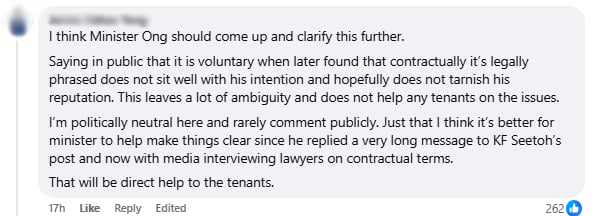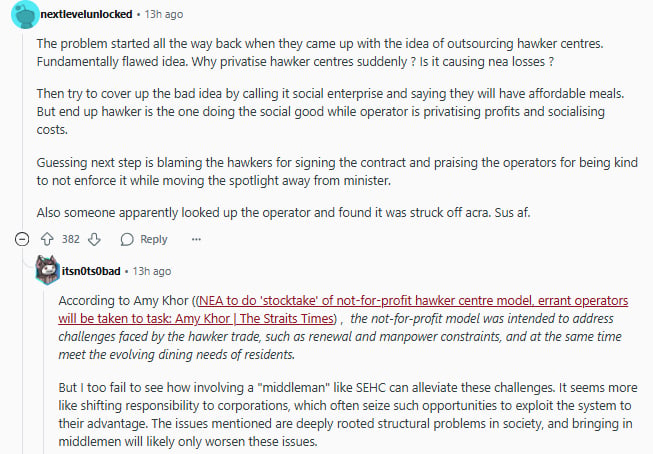SINGAPORE: Hawkers at Bukit Canberra Hawker Centre are contractually obliged to take part in a scheme providing free meals, according to lawyers.
CNA reported that a 2024 version of the tenancy agreement states that a stall tenant “shall participate” in the pay-it-forward programme “as implemented and/or directed by the company”, requiring them to set aside 100 meals at their own expense for the scheme.
Other clauses stipulate that tenants must offer at least two menu items priced below S$3 and display them prominently, as well as provide a 10 per cent discount on other menu items to CHAS Blue, Pioneer Generation, and Merdeka Generation cardholders.
Adrian Wee, managing partner of Lighthouse Law, said the language of the clauses leaves no doubt that participation is mandatory.
“The use of the word ‘shall’ suggests that the tenant is obliged to participate in the scheme and that this is one of several obligations imposed under the tenancy,” he said.
“The fact that the scheme has not yet started has no bearing on whether the tenant will eventually be obliged to participate if and when it begins.”
Lawyer Chooi Jing Yen agreed, stating that the word “shall” means hawkers are legally bound to take part in the programme.
“Technically, if the hawkers fail to comply, that would be a breach of the contract,” he added.
Operator Explains Rationale and Changes
On 12 August, Canopy Hawkers Group, operator of Bukit Canberra Hawker Centre, addressed the free meals programme in a Facebook post.
It said that during the stall application stage three years ago, there had been “overwhelming interest” and the selection process was “not easy”.
Preference was given to hawkers who shared its vision of offering free meals to low-income residents, and the scheme was therefore written into the tenancy contracts.
The original requirement of 30 free meals per month was later reduced to a total of 100 meals over the three-year lease, following discussions after the hawker centre opened.
This change was formalised in a contract variation in August 2023.
The operator stressed that the programme has not yet started and preparatory work is still underway, meaning “there is no obligation on the part of the hawkers, and no penalties to speak of”.
It added that while hawkers had agreed to participate at the point of selection, it acknowledged the view that “charity should not be contractual” and said this would be reviewed before the scheme begins.
Wee noted that if hawkers were chosen specifically for agreeing to provide free meals, it is unsurprising that their participation was written into the contract as a binding obligation.
However, he stressed that if something is truly voluntary, this should be clearly reflected in the agreement — or omitted entirely.
Chooi pointed out that accepting tenants based on their willingness to participate while publicly stating the scheme is voluntary appears contradictory.
He said hawkers could invoke the legal principle of “estoppel” if penalties were enforced, arguing that the operator had publicly stated the programme was voluntary despite contractual wording.
From the operator’s Facebook post, Chooi added, it appears that the operator has acknowledged that a voluntary charity scheme should not have been included in the contract if it would not be enforced.
Government: Scheme Is Voluntary, No Penalties
On 11 August, Minister for Health Ong Ye Kung, who is also MP for Sembawang GRC, responded to earlier criticism from food critic KF Seetoh.
The dispute began when Seetoh, in a 4 August video, raised concerns that hawkers were billed monthly for storage space used by suppliers.
In a subsequent Facebook post on 8 August, he claimed hawkers were required to provide 30 free meals each month for a Customer Relationship Management (CRM) initiative and another 30 for the “Pay-it-Forward” programme — without subsidies.
Ong clarified that there were “no penalties” for hawkers who did not or could not provide charity meals, describing the initiative as voluntary and aimed at encouraging hawkers to support low-income residents.
He also noted that the programme had not yet begun.
Investigation Reveals Contract Penalties
However, a Lianhe Zaobao investigation found that tenancy contracts for Bukit Canberra Hawker Centre do impose penalties on stallholders who fail to participate in the free meal scheme, despite earlier assurances to the contrary.
The Chinese-language daily reviewed a 2022 contract requiring hawkers to join both the “Pay It Forward” programme and a customer loyalty scheme.
Failure to take part in either would result in six demerit points and a S$50 penalty per offence.
The contract further states that accumulating 12 points in one year would make a stallholder ineligible for lease renewal, while 24 points could lead to termination of the lease with two months’ notice.
On 14 August, lawyer Yeoh Lian Chuan suggested Ong’s statement could be “false or misleading” within the meaning of POFMA” because it could convey to at least some readers that no penalty clauses existed at all — rather than that they simply were not being enforced yet.
Yeoh stressed that he believed any inaccuracy was likely due to inadequate briefing rather than deliberate misrepresentation. Nonetheless, he saw the case as “yet another illustration” of why POFMA is, in his view, “a bad law”.
Legal Obligations vs Voluntary Claims
The discussion has garnered over 600 comments on Reddit and CNA’s Facebook post, with netizens debating the initiative and if it constitutes a contractual obligation.
Many noted that if participation is written into the contract, it is legally binding unless explicitly stated otherwise.


Some pointed out that although the scheme may not be enforced immediately, hawkers would have no grounds to object if management decided to enforce it later.
One user observed that authorities have repeatedly emphasised the programme has not started yet — but once it does, hawkers would be contractually required to provide the meals.
The user added that nothing in the contracts indicates that participation is voluntary.


Another criticised the government for “mixing business with charity”, calling it risky and inappropriate to include charitable obligations in a contract while publicly stating participation is voluntary.
“Double talk has no place in a contract. Not fulfilling a contract obligation is a breach,” the user wrote.

One user urged Minister Ong to clarify the matter, warning that public statements suggesting the scheme is voluntary, when contracts say otherwise, create ambiguity and could damage his credibility.

Burden on Hawkers
Several commenters argued that the financial and operational burden of providing free meals should not fall on hawkers, many of whom are already struggling.
They suggested that if the government or landlord wants to promote charitable efforts, they should contribute directly rather than expecting hawkers to bear the cost.


Criticism of Management and Outsourcing
Others criticised the broader management model of the hawker centre. Some argued that the issue stems from the privatisation of hawker centres, describing it as a flawed idea.
“The operator is privatising profits and socialising costs, while hawkers are left to do the social good,” one user wrote.


Another said this is “another example of why privatisation in Singapore should stop”, claiming it only funnels money to the wealthy under the disproven notion of “trickle-down” economics.

One user suggested hawker centres should be directly managed by the National Environment Agency (NEA) rather than private firms, noting that private management increases costs for hawkers while prioritising profits for owners and shareholders.

The post Netizens dispute ‘voluntary’ claim over Bukit Canberra hawkers’ binding free meals clause appeared first on The Online Citizen.


